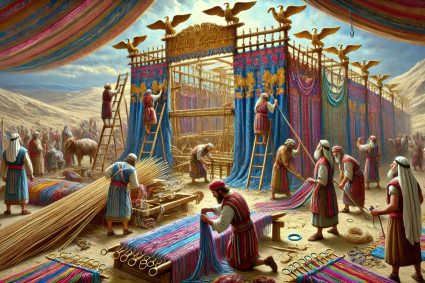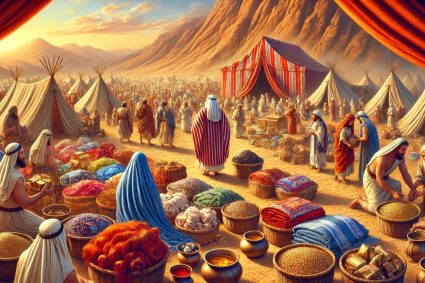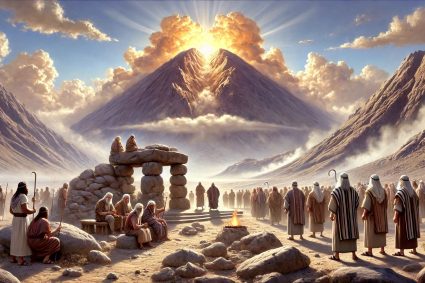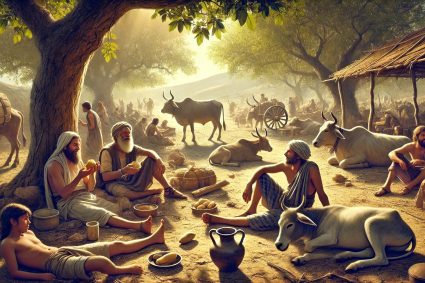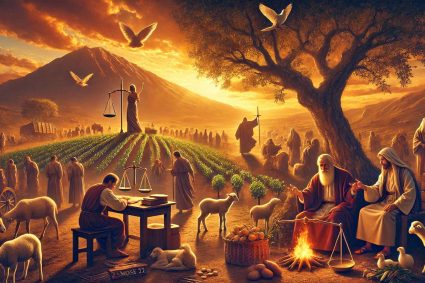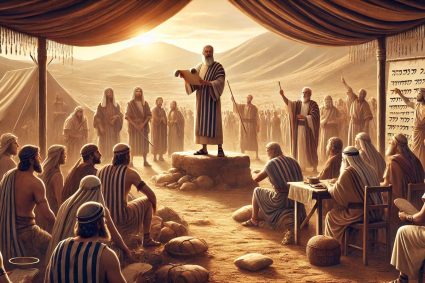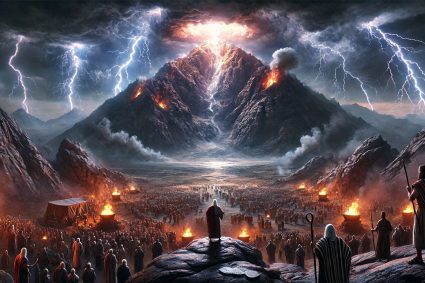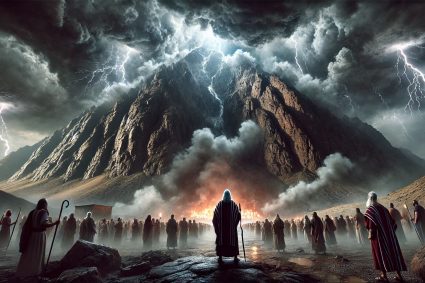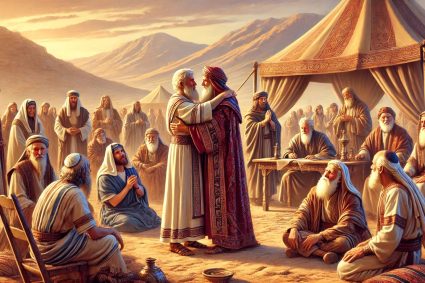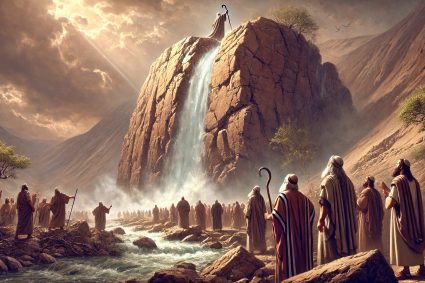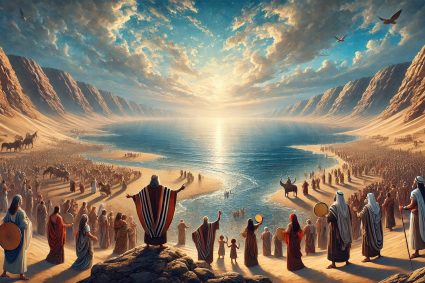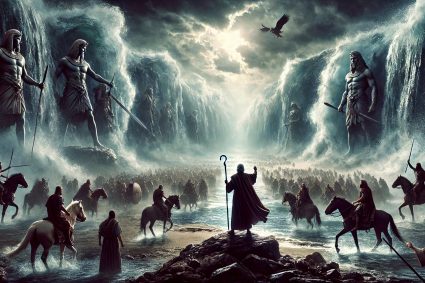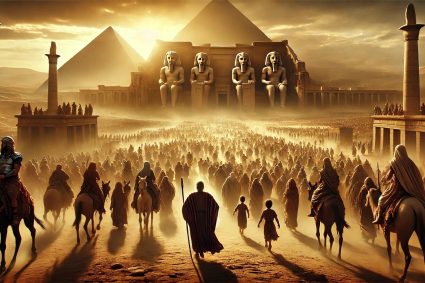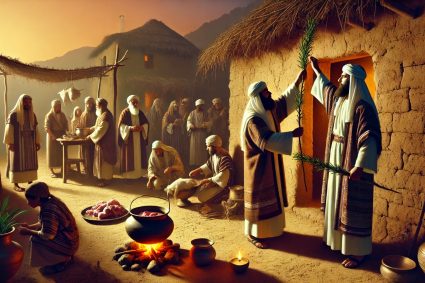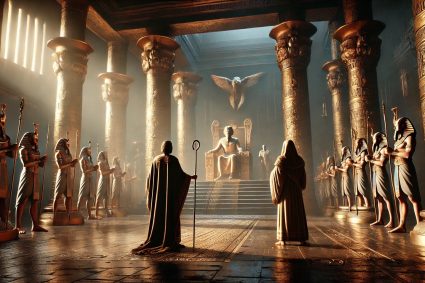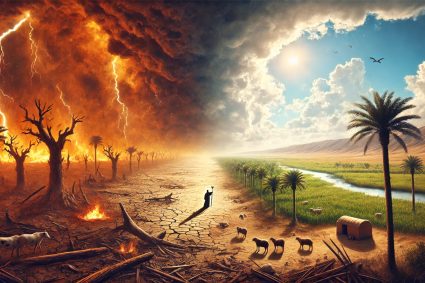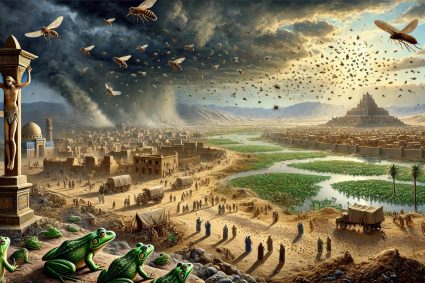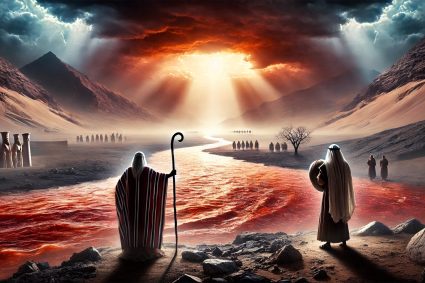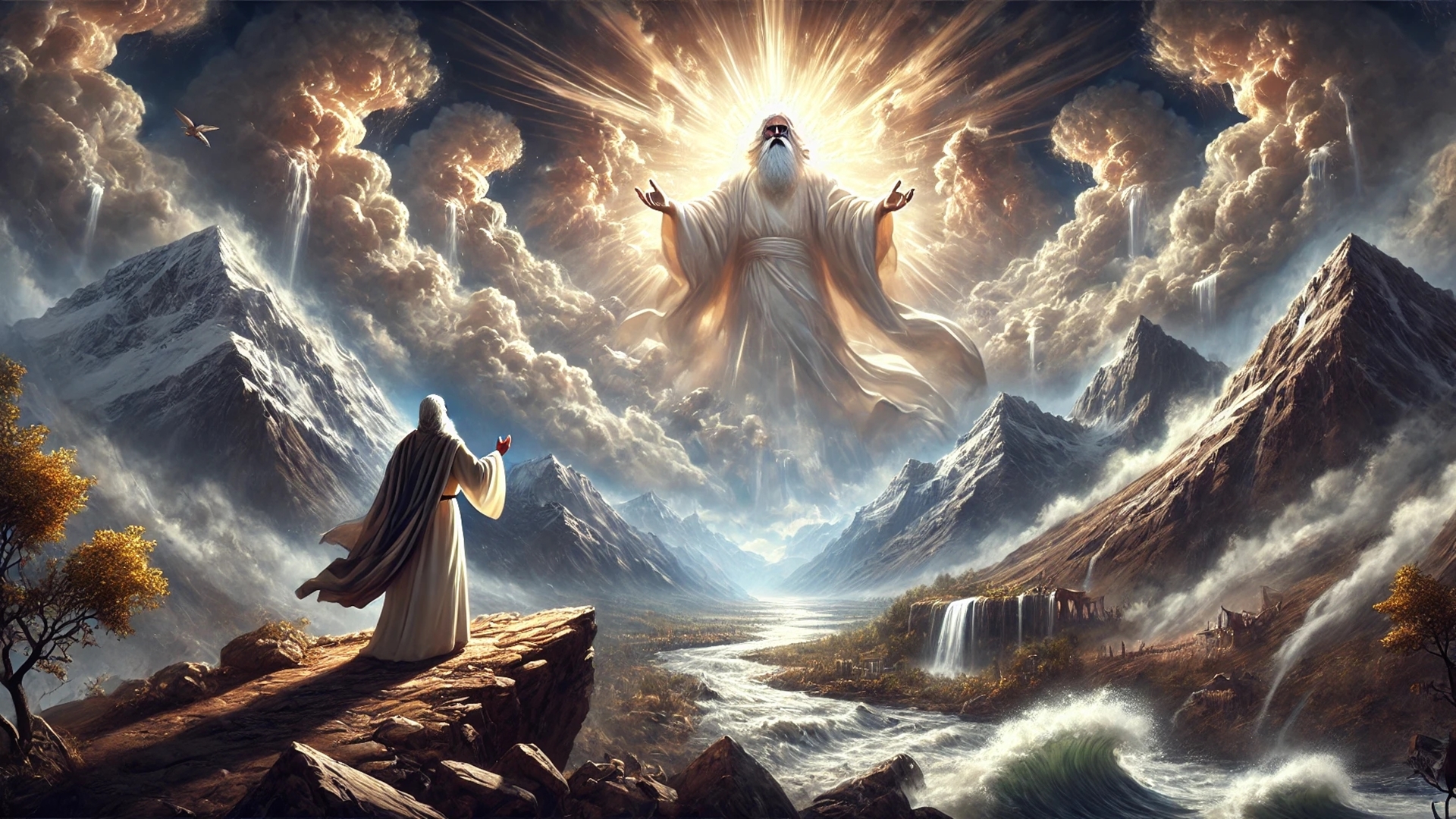
July 7, 2024
DAILY BIBLE READING – Habakkuk Chapter 3
1 A prayer of Habakkuk the prophet upon Shigionoth.
2 O Lord, I have heard thy speech, and was afraid: O Lord, revive thy work in the midst of the years, in the midst of the years make known; in wrath remember mercy.
3 God came from Teman, and the Holy One from mount Paran. Selah. His glory covered the heavens, and the earth was full of his praise.
4 And his brightness was as the light; he had horns coming out of his hand: and there was the hiding of his power.
5 Before him went the pestilence, and burning coals went forth at his feet.
6 He stood, and measured the earth: he beheld, and drove asunder the nations; and the everlasting mountains were scattered, the perpetual hills did bow: his ways are everlasting.
7 I saw the tents of Cushan in affliction: and the curtains of the land of Midian did tremble.
8 Was the Lord displeased against the rivers? was thine anger against the rivers? was thy wrath against the sea, that thou didst ride upon thine horses and thy chariots of salvation?
9 Thy bow was made quite naked, according to the oaths of the tribes, even thy word. Selah. Thou didst cleave the earth with rivers.
10 The mountains saw thee, and they trembled: the overflowing of the water passed by: the deep uttered his voice, and lifted up his hands on high.
11 The sun and moon stood still in their habitation: at the light of thine arrows they went, and at the shining of thy glittering spear.
12 Thou didst march through the land in indignation, thou didst thresh the heathen in anger.
13 Thou wentest forth for the salvation of thy people, even for salvation with thine anointed; thou woundedst the head out of the house of the wicked, by discovering the foundation unto the neck. Selah.
14 Thou didst strike through with his staves the head of his villages: they came out as a whirlwind to scatter me: their rejoicing was as to devour the poor secretly.
15 Thou didst walk through the sea with thine horses, through the heap of great waters.
16 When I heard, my belly trembled; my lips quivered at the voice: rottenness entered into my bones, and I trembled in myself, that I might rest in the day of trouble: when he cometh up unto the people, he will invade them with his troops.
17 Although the fig tree shall not blossom, neither shall fruit be in the vines; the labour of the olive shall fail, and the fields shall yield no meat; the flock shall be cut off from the fold, and there shall be no herd in the stalls:
18 Yet I will rejoice in the Lord, I will joy in the God of my salvation.
19 The Lord God is my strength, and he will make my feet like hinds’ feet, and he will make me to walk upon mine high places. To the chief singer on my stringed instruments.
King James Version. Public Domain
Commentary
Introduction:
Habakkuk 3 is a powerful and poetic psalm of the prophet, representing a prayer and praise to God. It is a response to the divine revelations and answers that Habakkuk received in the previous chapters. This psalm expresses both awe at God’s power and trust in His mercy and justice.
Verses 1-2: A Prayer for Renewal
Habakkuk begins with a prayer acknowledging God’s power and wonders. He asks God to make His work known in the midst of the years and to show mercy in times of distress. This demonstrates the prophet’s trust in God’s ability to bring both judgment and grace.
Verses 3-7: A Vision of God’s Glory
In these verses, Habakkuk describes a majestic vision of God’s appearance. God comes from Mount Paran, surrounded by light and rays that reveal His power. Pestilence and plague go before Him, and the earth quakes at His presence. These powerful images emphasize God’s overwhelming power over nature and nations.
Verses 8-15: God’s Intervention in History
Habakkuk recalls God’s mighty deeds in history, especially the deliverance of Israel. He describes God’s wrath over the waters and His riding on horses, indicating His control over the elements and His ability to fight for His people. Nature responds to God’s presence, and the heathens are shattered. These passages highlight that God actively intervenes in history to save His people and bring justice.
Verses 16-19: Trust and Joy Amidst Troubles
Habakkuk concludes with a personal reflection on his response to God’s revelation. Though he is gripped by fear and trembling, he chooses to wait quietly until the time of distress passes. He acknowledges that there will be times when the harvest fails and the flocks disappear, yet despite these adversities, he will rejoice in the Lord and exult in God, his salvation. He affirms his trust in God’s strength and His ability to carry him through difficult times, comparable to a deer that leaps securely over the heights.
Conclusion:
Habakkuk 3 is a moving example of deep trust and faith in God, even in the face of great difficulties and uncertainties. The prophet shows us how to acknowledge God’s power and justice while hoping for His mercy. Habakkuk’s praise and trust in God serve as inspiration and encouragement for all believers to rely on God during tough times and to find joy in His presence.
![]()

WEEKLY SPIRIT OF PROPHECY READING – Ellen White | The Desire of Ages Chapter 45: The Foreshadowing of the Cross
This chapter is based on Matthew 16:13-28; Mark 8:27-38; Luke 9:18-27.
Read online here
Commentary
Introduction:
This chapter deals with the profound preparation and awareness of Jesus regarding his impending suffering and death. Based on the Gospels of Matthew, Mark, and Luke, it highlights Jesus’ foreknowledge of his path to the cross and his dedication to fulfilling God’s will.
Jesus’ Awareness of His Suffering:
Jesus was fully aware of the pain and agony that awaited him. Even before his incarnation, he had foreseen the entire path of suffering. Despite knowing the impending torments, insults, and deprivations, he chose to walk this path out of love for humanity. His willingness to fulfill God’s will demonstrates his deep dedication and obedience to the Father.
The Significance of the Cross:
The cross is a central symbol in this chapter. Jesus saw it not only as an instrument of his suffering but also as a means of redeeming humanity. Despite the impending pain, he was encouraged by the prospect of human salvation. His suffering and death were meant to bring people back to faithfulness to God.
Preparation of the Disciples:
Jesus prepared his disciples for the upcoming events. He knew they would witness his crucifixion and death and wanted to strengthen them. In a city near Caesarea Philippi, far from the influence of the Jews, he spoke with them about their faith and reaffirmed their conviction that he was the Messiah.
Peter’s Confession:
Peter confessed that Jesus was the Christ, the Son of the living God. Jesus praised him for this and explained that this revelation did not come from human wisdom but through divine inspiration. This recognition formed the foundation of the disciples’ faith and the future Church.
The Announcement of Jesus’ Suffering:
For the first time, Jesus spoke openly about his impending suffering and death. This announcement deeply shocked the disciples, as they were still hoping for an earthly kingdom. Peter’s attempt to dissuade Jesus was sharply rebuked by Jesus, as he misunderstood the divine mission.
The Concept of Self-Denial:
Jesus explained to his disciples the necessity of self-denial and taking up the cross. This meant denying one’s own self and being willing to endure suffering for the sake of Christ. This message was and still is a central teaching of the Christian faith.
Encouragement through the Promise:
Jesus encouraged his disciples with the promise of his coming kingdom in glory. Although they did not fully grasp the depth of his words, he gave them hope that they would ultimately see his glory.
Conclusion:
Chapter 45 shows the profound preparation and awareness of Jesus regarding his suffering and his dedication to fulfilling God’s will. It emphasizes the necessity of self-denial and taking up the cross for every follower of Christ. The disciples were prepared for the coming trials while Jesus simultaneously encouraged them with the hope of his ultimate glory. These teachings remain relevant today and inspire believers to remain steadfast in their faith and follow Jesus.

WEEKLY SPIRIT OF PROPHECY READING – Ellen White | The Desire of Ages Chapter 46: He Was Transfigured
This chapter is based on Matthew 17:1-8; Mark 9:2-8; Luke 9:28-36.
Read online here
Commentary
Introduction:
Chapter 46 describes the Transfiguration of Jesus, based on accounts from the Gospels of Matthew, Mark, and Luke. This episode reveals a significant disclosure of Jesus’ divine nature and provides the disciples with a brief glimpse of heavenly glory.
The Ascent on the Mountain:
Jesus takes Peter, James, and John with him to a secluded mountain. Although they are exhausted, the disciples follow their Master into the evening hours. The darkness enveloping the mountain symbolizes the sorrow and trials that Jesus and his disciples will soon face.
Jesus’ Prayer:
Jesus moves a short distance from the disciples to bring his concerns and needs before the heavenly Father in prayer. He asks for strength to endure the forthcoming suffering and for a revelation of his glory to strengthen the disciples’ faith. Despite their efforts to stay awake, the disciples are overcome with fatigue and fall asleep.
The Transfiguration:
While Jesus prays, the heavens open, and a holy radiance envelops him. The divine within him shines through his human form, and his appearance becomes as bright as the sun. Moses and Elijah appear and converse with Jesus about his impending death in Jerusalem.
Significance of Moses and Elijah:
Moses represents those who will be resurrected at Christ’s return, while Elijah represents those who will be transformed without experiencing death at Christ’s return. Their presence confirms Jesus’ divinity and the fulfillment of Old Testament prophecies.
The Disciples’ Reaction:
The disciples awaken and are overwhelmed by the heavenly glory. In his enthusiasm, Peter suggests building three shelters to preserve this moment. However, the significance of the Transfiguration lies not in earthly reign but in the confirmation of Jesus’ divine mission, which must pass through the cross.
God’s Voice:
A bright cloud overshadows them, and God’s voice declares, “This is my beloved Son, with whom I am well pleased; listen to him.” The disciples fall to the ground in fear until Jesus calms them and helps them up. This experience strengthens their faith and gives them a deeper understanding of Jesus’ identity and mission.
Conclusion:
The Transfiguration is a significant revelation of Jesus’ divine nature and serves to strengthen the disciples’ faith and prepare them for the upcoming sufferings. It shows that Jesus is indeed the Messiah foretold by the prophets and that his suffering and death are part of the divine plan of redemption. The Transfiguration gives the disciples a foretaste of future glory and confirms that Jesus is the Son of God, whom they are to follow.
(Visited 14 times, 1 visits today)

